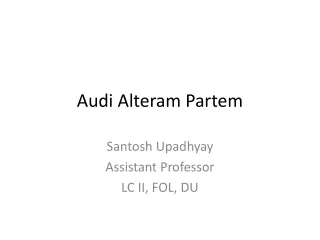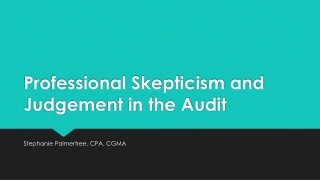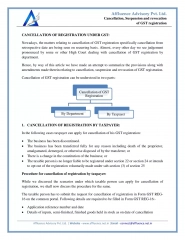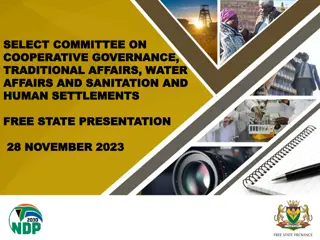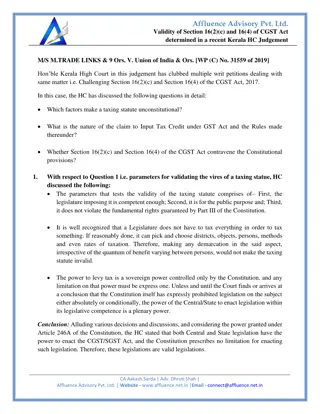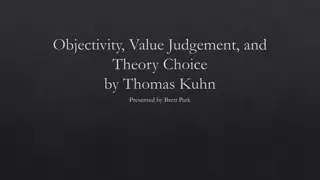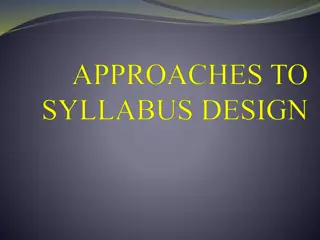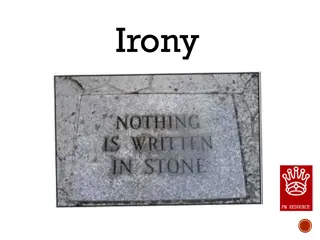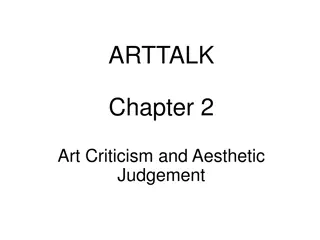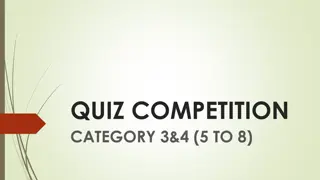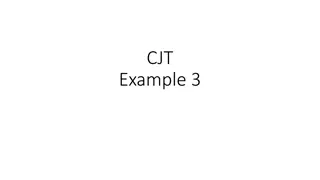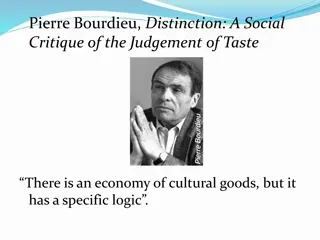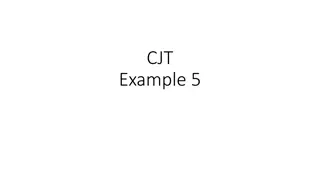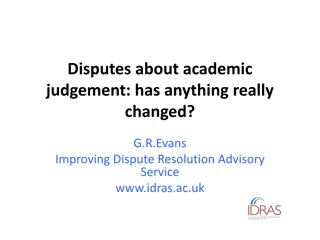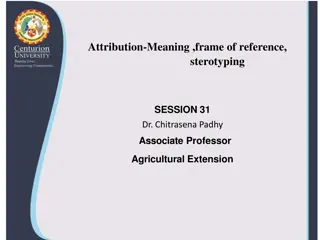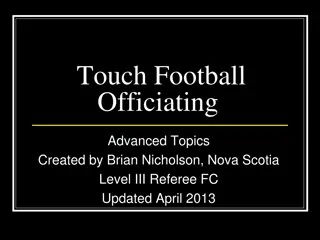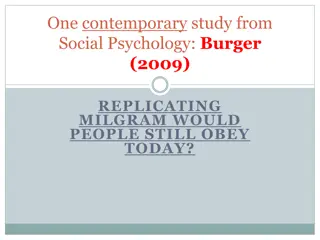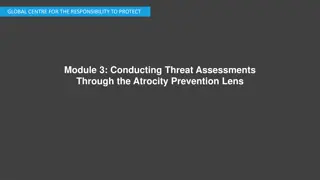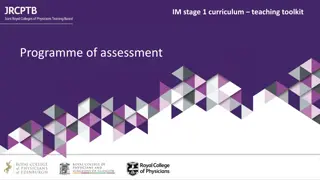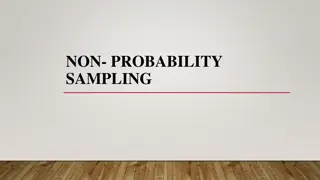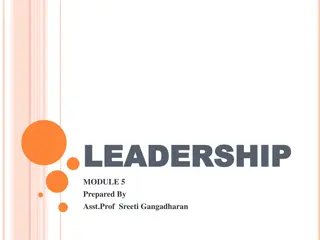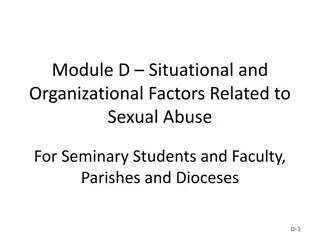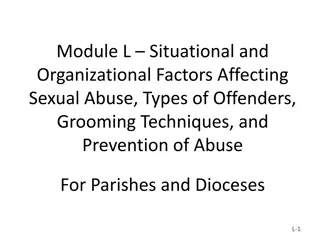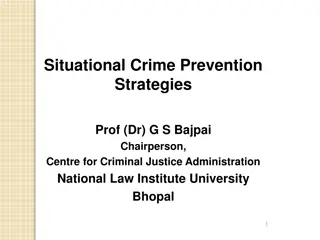Audi Alteram Partem
Explore the fundamental concept of fairness and justice in human society through the principle of Audi Alteram Partem, which ensures that both sides are heard before passing a judgement. This principle is a basic requirement of the rule of law and is essential for upholding civilised society.
1 views • 35 slides
Professional Skepticism and Judgement in the Audit
The importance of professional skepticism and judgment in the audit process. It covers topics such as critical assessment of evidence, audit evidence, due professional care, and the relationship between skepticism and due care.
14 views • 40 slides
Cancellation, Suspension and revocation of GST registration
the matters relating to cancellation of GST registration specifically cancellation from retrospective date are being seen on recurring basis. Almost, every other day we see judgement pronounced by some or other High Court dealing with cancellation of GST registration by department.\nHence, by way of
0 views • 8 slides
Progress Report on Mafube Local Municipality's Implementation of Financial Recovery Plan
Mafube Local Municipality has faced challenges leading to a court judgement due to service delivery failures. The municipality invoked Section 139 to implement a Financial Recovery Plan (FRP). Progress report includes delays in FRP development, focus on financial management, infrastructure projects,
0 views • 29 slides
March 2024- Latest GST Notifications and Judgement
In the latest edition of \u201cGST Update and Judgements: March 2024,\u201d we will delve into the most recent developments in Goods and Services Tax (GST) regulations and legal interpretations. In this comprehensive update, we bring insights into the key GST amendments and noteworthy judicial decis
1 views • 30 slides
Impact of Situational Leadership Readiness in Elementary School
The study explores how situational leadership styles, specifically in the dimensions of Selling, Telling, Participating, and Delegating, impact elementary school leadership. Research conducted at an elementary school in Ciniru, Kuningan, relied on qualitative methods including observation, interview
1 views • 10 slides
Validity of Section 16(2)(c) and 16(4) of CGST Act determined in HC Judgement
The Kerala High Court upheld Sections 16(2)(c) and 16(4) of the CGST Act, affirming their constitutional validity. The court ruled that Input Tax Credit (ITC) is a conditional entitlement, not an absolute right. The judgement emphasized the importance of the statutory scheme, rejecting challenges to
1 views • 3 slides
Objectivity, Value Judgement, and Theory Choice in Science
Thomas Kuhn's work explores the subjective elements in theory choice, highlighting that theory selection is not solely based on objective algorithms. He discusses the structure of scientific revolutions, where science shifts between normal and revolutionary phases. Kuhn's ideas have faced criticisms
6 views • 19 slides
Understanding Language Teaching Syllabus: Integration, Theory, and Approaches
Language Teaching Syllabus involves the integration of subject matter and linguistic elements, guided by theories of language and learning. Various approaches like Grammatical, Situational, Communicative, and Analytic are used to structure syllabi. Breaking language into parts aids in sequential lea
1 views • 28 slides
Understanding Irony in Verbal, Dramatic, and Situational Contexts
Explore the nuances of verbal, dramatic, and situational irony through examples and explanations. Verbal irony involves saying something different from what is meant, often using humor like puns. Dramatic irony occurs when the audience knows something the characters don't, creating suspense. Situati
0 views • 12 slides
Understanding Hospital Bed Turnover and Situational Leadership Characteristics
Hospital bed turnover is crucial for assessing hospital productivity, with turnover interval (TOI) indicating the average period a bed remains empty. Bed turnover rate (BTR) measures patient care efficiency. Situational leadership, adaptable to group needs, involves directing and coaching based on g
2 views • 7 slides
Understanding Art Criticism and Aesthetic Judgement
Explore the world of art criticism and aesthetic judgement in Chapter 2 of ARTTALK. Discover the purpose of art criticism, learn to critique art, and understand aesthetic theories. Dive into the realm of professional critics, criteria for judgement, and the importance of forming your own opinions in
1 views • 38 slides
Exploring Situational Leadership and Mindset in Educational Leadership
This educational session delves into Situational Leadership, utilizing the Hersey-Blanchard framework, to tailor leadership approaches based on the mindset, skill, and will of educators. It also discusses growth versus fixed mindsets and includes a practical mindset vignette for application. Partici
0 views • 13 slides
Enhancing Defensive Skills and Situational Awareness in Hockey
Enhancing defensive skills and situational play in hockey is crucial for success. All team members can contribute to team defense by developing skills like skating, body checking, understanding the ice surface defensively, read and react abilities, and effective communication. Proper skating skills
3 views • 45 slides
The Wrath of God: A Biblical Perspective on Divine Judgement
The images depict key messages from Romans 1:18-23 emphasizing the concepts of God's love and forgiveness, holiness, judgement upon ungodliness and sin, the reality of Hell, and humanity's accountability before God for rejecting Him through ungodliness and unrighteousness. They highlight that all ar
0 views • 16 slides
Quiz Competition for Category 3 & 4: Test Your Quran Knowledge
Participate in this quiz competition to challenge your understanding of the Quran. Explore questions about the Quran's aliases, completion duration, famous companions involved in its preservation, count of Sajdah Ayahs, and identifying the longest Surah. Test your knowledge on the Day of Judgement's
0 views • 65 slides
Clinical Judgement Test: Neonatal Foal Case Presentation and Assessment
This case involves a clinical judgement test scenario of an 8-hour-old Standardbred colt foal presenting with recumbency, weakness, and abnormal blood parameters. The foal's history suggests possible placental insufficiency and dysmaturity, leading to pulmonary dysfunction and other complications. I
0 views • 14 slides
Insights on Culture, Taste, and Society by Pierre Bourdieu
Pierre Bourdieu's work in "Distinction: A Social Critique of the Judgement of Taste" delves into the intricacies of cultural practices and societal classifications of taste. He explores how lifestyles become sign systems qualified by social distinctions, influenced by habitus and symbolic capital. B
0 views • 16 slides
Understanding Irony: Verbal, Dramatic, and Situational Examples
Dive into the world of irony with examples of verbal, dramatic, and situational irony explained through scenarios like sarcastic comments, horror movie twists, and unexpected encounters. Explore how irony adds layers of meaning and depth to storytelling, from characters knowing more than others to o
0 views • 10 slides
Clinical Judgement Test: Research Question Relevance and Study Design Assessment
This document presents a Clinical Judgement Test focusing on the relevance of a research question and the appropriateness of the study design. Candidates are evaluated on their critical review skills and ability to assess both strengths and weaknesses of the research methodology employed. The test a
0 views • 12 slides
Academic Judgement Disputes: The Evolution of Challenge and Resolution
Academic judgement disputes persist as students challenge assessment decisions while institutions encounter barriers in addressing these challenges effectively. Issues of academic infallibility, expertise of examiners, and human rights implications are explored within the academic framework.
0 views • 19 slides
Understanding Attribution Theory: Exploring Dispositional vs. Situational Attribution
Attribution theory examines how people explain behavior and events by analyzing internal vs. external causes. Heider's influential ideas on dispositional vs. situational attributions are discussed. Dispositional attribution focuses on internal characteristics, while situational attribution relates b
0 views • 14 slides
Ezekiel - The Watchman of Israel: Summary of Judgement, Oracles, and Blessings
In the book of Ezekiel, the prophet serves as a watchman over Israel, delivering messages of judgement on Judah and Jerusalem, denouncing the false prophets and prophetesses, and foretelling the fate of the people. The narrative covers various chapters detailing accusations, inquiries, parables, and
0 views • 9 slides
Advanced Topics in Touch Football Officiating
This guide delves into advanced touch football officiating topics to help referees enhance their skills and ensure the smooth progress of the game within the rules. It covers diverse areas such as preventing infractions, ensuring player safety, building respect, and maintaining integrity. Key aspect
0 views • 90 slides
Ezekiel - The Prophet of Judgement and Blessings
Ezekiel, the watchman of Israel, prophesied about the judgment on Judah and Jerusalem, oracles against foreign nations like Ammon, Moab, Edom, and Philistia, as well as blessings for Judah and Jerusalem. The oracles continue with prophecies against Tyre, Babylon, Egypt, and Assyria, symbolized by va
0 views • 11 slides
Replicating Milgram's Obedience Study: Burger's Contemporary Research
Burger's 2009 study aimed to partially replicate Milgram's famous obedience experiments to explore if obedience levels have changed over time, focusing on the influence of situational factors. Using a similar setup, Burger found that individuals still exhibit high obedience rates, challenging assump
0 views • 44 slides
Conducting Threat Assessments Through the Atrocity Prevention Lens
This module from the GLOBAL CENTRE FOR THE RESPONSIBILITY TO PROTECT focuses on conducting threat assessments through an atrocity prevention lens. It covers risk identification, situational awareness in field settings, information collection methods, addressing vulnerabilities of women and children,
0 views • 20 slides
Internal Medicine Stage 1 Programme of Assessment Toolkit
The programme of assessment for Internal Medicine Stage 1 emphasizes the importance of professional judgement in assessing learners' progress and performance. It includes MRCP(UK) assessments, workplace judgements, and feedback mechanisms to support decisions on trainee progression and completion. A
0 views • 27 slides
Messy Situational Map Template with Suggestions for Use
This SA template provides a messy situational map template along with suggestions for use. The initial map should be done by hand on a large piece of paper to allow for quick adjustments and capturing thoughts. The template includes an abstract map and a customizable version for creating more readab
0 views • 4 slides
Comprehensive Overview of Leadership Theories and Styles
Leadership encompasses the ability to influence a group towards achieving goals by knowing oneself, communicating vision, building trust, and taking effective action. Various leadership styles include Autocratic, Democratic, Free-Rein, and Paternalistic, each with distinct decision-making approaches
0 views • 19 slides
Divine Judgement on Egypt: The Story of Moses and Pharaoh
The story of Divine Judgement on Egypt unfolds as Moses and Aaron confront Pharaoh, demanding the release of the Israelites from slavery. Despite warnings and miraculous signs, Pharaoh's heart remains hardened, leading to a series of powerful judgments from God. This narrative highlights the consequ
0 views • 18 slides
Understanding Non-Probability Sampling Methods
Non-probability sampling involves selecting samples based on subjective judgement rather than random selection. This method may not give all population members an equal chance to participate. Types include convenience sampling, quota sampling, judgemental sampling, and snowball sampling.
1 views • 7 slides
Understanding Assessment Centres: Psychometric Tests, Situational Judgement, and More
Assessment centres often include psychometric tests, ability testing, and situational judgement assessments to evaluate candidates. These tests help employers understand your personality, behaviours, decision-making skills, and ability to work in different scenarios. By participating in these assess
0 views • 25 slides
Leadership Insights: Traits, Differences, and Framework
Leadership involves guiding others towards shared goals through vision, inspiration, knowledge, and resilience. It distinguishes from management in focus and approach. Analyzing leadership involves assessing leader traits, situational factors, and follower dynamics. The leadership framework comprise
0 views • 36 slides
Situational and Organizational Factors in Sexual Abuse by Catholic Priests
The content discusses situational and organizational factors related to sexual abuse involving seminary students, faculty, parishes, and dioceses. It covers settings and circumstances of sexual abuse, including locations where victims first encountered abusive priests. Data reports from the United S
0 views • 28 slides
Understanding Situational Factors in Sexual Abuse by Catholic Priests
This module delves into the situational and organizational factors influencing sexual abuse of minors by Catholic priests, exploring types of offenders, grooming techniques, and prevention strategies for parishes and dioceses. It highlights key data reports on sexual abuse cases, examines settings a
0 views • 49 slides
Understanding Situational Crime Prevention Strategies
Situational crime prevention strategies aim to reduce crime by altering environmental conditions, influencing offender decisions, and targeting crime opportunities. Primary prevention focuses on modifying physical and social environments, while secondary prevention aims to identify potential offende
1 views • 31 slides
Understanding Irony: Types, Purpose, and Examples
Irony is about expectations and contrast between reality and what is being said. It can add interest, depth, suspense, and humor to texts. The three types of irony are verbal, dramatic, and situational, each serving a unique purpose to engage the audience. Examples from popular stories like Beauty a
0 views • 12 slides
Enhancing Situational Awareness for Home Visit Safety
Situational awareness is crucial for observing and being attentive to your surroundings to prevent accidents and errors. Understanding different levels of situational awareness, from a relaxed alert state to an active threat response, can significantly improve safety and decision-making in everyday
0 views • 14 slides
Overview of the UCAT 2024 University Clinical Aptitude Test
The UCAT, used by UK medical and dental schools, assesses various mental abilities. It is a 2-hour computer-based test covering verbal reasoning, decision making, quantitative reasoning, abstract reasoning, and situational judgement. Students must sit the test in the same year they apply through UCA
0 views • 36 slides
